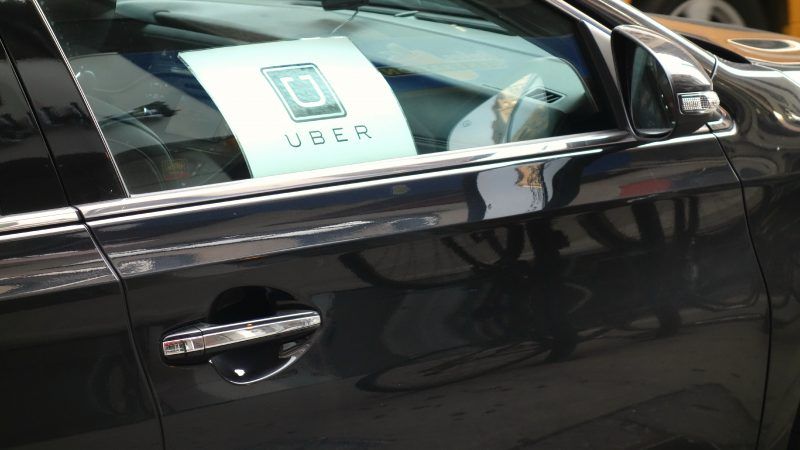New California Bill Says Uber's Drivers Are Employees. Uber Disagrees.
The bill would upend the gig economy.

In a move that labor activists and liberal legislators hailed as a win for the little guy, California's AB5, which is poised to classify gig economy workers as fully-fledged employees, passed the state Senate on Wednesday. But Uber—the main target of the legislation—said in a statement that its drivers perform work "outside the usual course" of the company's business and will thus remain independent contractors.
Under the proposed law, reclassifying gig economy workers would entitle them to wage protections and a full slate of benefits, including health care, paid time off, and reimbursement for expenses. Yet Uber claims the law does not actually affect the drivers who use the company's app to give rides. "AB5 does not provide drivers with benefits, nor does it give drivers the right to organize. In fact, the bill currently says nothing about rideshare drivers," Tony West, Chief Legal Officer at Uber, wrote in a statement. "What AB5 does do is fairly straightforward: it inserts into the California labor code a new legal test that must be used when determining whether a worker is classified as an independent contractor or an employee."
That standard was established in Dynamex Operations West, Inc. v. Superior Court of Los Angeles, a 2018 California Supreme Court decision that created the "ABC test" for ascertaining employee versus contractor status. To prove that their workers are contractors and not employees, companies must show that those workers control their workload, perform work that falls outside of the business's normal scope, and are "customarily engaged" in the occupation or business.
The second requirement is arguably the hardest box to check. "But just because the test is hard does not mean we will not be able to pass it," West said. "In fact, several previous rulings have found that drivers' work is outside the usual course of Uber's business, which is serving as a technology platform for several different types of digital marketplaces."
That claim will almost certainly be challenged in court—something West also acknowledged. The company is willing to negotiate, however, offering drivers a $21 minimum hourly wage when they are driving a passenger or are en route to pick up a new client. California legislators rejected that compromise.
"California has a long history of Wall Street billionaires pumping a fortune into ballot measures to further erode the middle class for their benefit," Assemblywoman Lorena Gonzalez (D–San Diego), who authored the bill, said in a statement. But as The New York Times reports, many of those beneficiaries have lobbied against the bill, citing their desire to continue working a flexible schedule.
If drivers found themselves classified as employees, gig economy companies would need to schedule workers in shifts, limiting employee hours and removing the autonomy that has come to define app-based professions. They would also have to eliminate scores of positions in order to remain financially solvent. About 6,461 Lyft drivers in Gonzalez's district alone would find themselves without work, according to a study prepared by the consulting firm Beacon Economics LLC for the ride-hailing company.
That's a big change for a business model that, in its current state, allows workers to simultaneously contract for competing companies and is available to large swaths of eager workers. Uber's door is currently wide open, so long as you are 21, have a driver's license, and own a decent car. That accessibility has been a game-changer for vulnerable populations. In Manhattan, first-generation immigrants who speak English as a second language make up 90 percent of app-based drivers.
But such a model would be untenable under AB5, as labor costs would explode overnight. Consumers would pay the price, too: Experts approximate that prices would increase 20 to 30 percent.
The provisions of AB5 would affect countless other industries. Newspapers, for instance, will no longer be permitted to classify freelance writers as contractors if they write more than 35 articles in a year for the same publication. With newspapers large and small struggling to survive and many prestigious outlets shuttering altogether, it's possible that publications will be forced to limit their regular freelancers rather than turn more freelancers into staff writers.
The bill will now head to Democratic Governor Gavin Newsom's desk, who has promised to sign it. But he told The Wall Street Journal that he's still willing to hear out opposing concerns from gig economy companies.
"These remain ongoing negotiations," he said, "and regardless of what happens with AB5, I am committed, at least, to continuing those negotiations."


Show Comments (28)